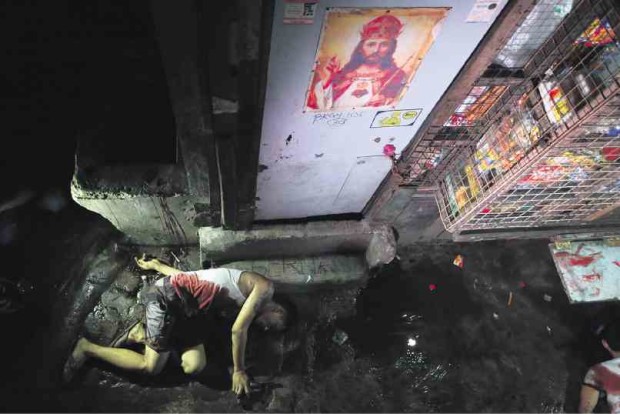‘Killings in drug war reminiscent of martial law abuses’

AWOL policeman Bobby Orit and his companion Danilo Guevarra lie dead in front of a store at the Aroma Compound in Vitas, Tondo, following a “shootout” with Manila policemen on Thursday. RAFFY LERMA/PHILIPPINE DAILY INQUIRER
The spate of suspected extrajudicial killings in the country amid the administration’s bloody war on drugs was evocative of human rights abuses and crimes of atrocities committed during martial law, militant umbrella group Bagong Alyansang Makabayan (Bayan) said on Wednesday.
On the 44th anniversary of the declaration of martial law, Bayan lamented that the Marcos dictatorship’s legacy of impunity and repression remains today even in the absence of authoritarian rule.
“Martial Law may not exist today but the social conditions that gave rise to it remain. Its legacy of impunity can still be seen in the ongoing military campaigns, occupation of communities and killing of civilians in the countryside. Its repressive legacy can still be seen in the more than 500 political prisoners who are currently detained for their beliefs and advocacy,” Bayan said in a statement.
READ: Robredo on martial law: ‘Not in this lifetime, never again’
“We are reminded of the plunder of the conjugal dictatorship when we see large-scale corruption in the bureaucracy. We are reminded of the Marcos cronies when we see big business using their influence in government to get juicy yet onerous contracts from privatization deals. We are likewise reminded of the abuses of the past with the ongoing killings in the war against drugs,” it added.
Article continues after this advertisementREAD: Bishop Bacani: Drug killings worse than martial law
Article continues after this advertisementAs of Sept. 19, the Inquirer’s “Kill List” notes 1,027 drug-related deaths since June 30 or after President Duterte took office.
Through Proclamation No. 1081, former President Ferdinand Marcos placed the country under martial law on Sept. 21, 1972, an era marked by curtailed press freedom, corruption, forced disappearances, arrest and killings of opposition forces, among other abuses.
Bayan said the Marcos family should be held accountable “for their reign of terror and plunder,” as it maintained its opposition to President Rodrigo Duterte’s directive of a hero’s burial for the late dictator and “any move to whitewash” the Marcoses’ “bloody record.”
“We pay the highest tribute to the brave men and women who were martyred by the fascist dictator. We continue to call for justice for all victims of the US-backed dictatorship and urge the people to never forget the lessons of history… We oppose any attempt to bestow formal state honors to the late dictator,” the statement read.
‘Free political prisoners’
The group also called on Duterte to fulfill his promise to free all political prisoners in the country “unjustly detained by previous regimes” and to address the root causes of armed conflict through the ongoing peace negotiations with the National Democratic Front of the Philippines.
Bayan said the peace talks were in recognition of the “historical lesson that even the most brutal fascist dictatorship and military campaigns cannot defeat the revolutionary movement so long as the social basis for armed struggle remains.”
“We call on the President to fulfill his commitment of issuing a general amnesty proclamation for all political prisoners. This is to correct a continuing injustice as well as to boost the prospects for a just peace,” Bayan said.
READ: Duterte to free political prisoners
“We likewise call on the government to accelerate social and economic reforms for the benefit of the people, in the main land reform and national industrialization, to decisively address social injustice. As Duterte’s 100 days in power approaches, the people are more eager to see basic and meaningful reforms,” it added.
Duterte earlier expressed willingness to release political prisoners as a confidence-building measure for the peace talks. But in July, the President said he was “not ready to release everybody.” IDL